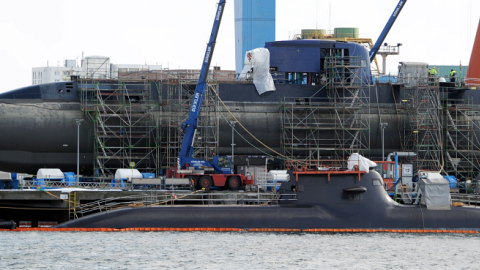Israel’s military accomplishments have often approached their biblical antecedents. Surrounded by the combined invasions of Egypt, Jordan, and Syria in 1948, the newly created Jewish state triumphed decisively. Anticipating attack by Egypt, Jordan, and Syria in 1967, Israel gained air superiority with a surprise strike that destroyed most of the Egyptian and—later in the same day—Syrian air forces as they sat parked on the ground. Israel’s success in the south helped the late Ariel Sharon decimate Egyptian tank forces in the Sinai. Israel won in six days and, among other accomplishments, threw Syrian forces from their commanding position atop the Golan Heights.
But the future strategic focus for Israel may be as much at sea as on land or in the air. What is concentrating the attention of Israeli strategy toward the sea? The need for physical distance between a threat and what needs to be protected – strategic depth.
The strategic depth that the Mediterranean offers will play an increasingly important role in Israel’s defense. This defense will be tested by the U.S. Mediterranean fleet’s virtual disappearance, and the increasing presence of Russia’s navy. It will be probed by Turkey, whose modernizing navy upended the regional balance of power in December 2013 by ordering a massive amphibious assault ship that can also function as an aircraft carrier. Israel’s defenses may also face the possibility of having to defend against Iranian nuclear-armed missile attack.
Instability in the Eastern Mediterranean is growing alongside the vulnerability of large natural gas finds in the exclusive economic zone (EEZ) Israel legally claims off its coast. Over the past five years the American energy company Noble, together with regional partners, has discovered about 35 trillion cubic feet (Tcf) of natural gas off Israel’s coast and within her EEZ. The U.S. Geological Survey estimates there may be as much as 122 Tcf of recoverable gas in the broader Levant Basin Province. Taken together, estimated gas deposits in Israel, Cyprus, and Greece could meet the needs of all 27 EU member states for almost 20 years. The geostrategic importance of these gasfields and the waters that surround them is obvious.
Seaborne defenses are needed to protect the gas fields which represent a large economic and diplomatic advantage to which Israel can turn for wealth, increased energy independence, and commercial ties that are more likely to moderate neighbors than various peace processes.
To meet these challenges, Israel has developed a maritime strategy based on three core missions: defending the nation’s increased economic reliance on the sea; sea control; and deterrence. The strategy represents a clear vision that future prosperity, a defense that keeps multiplying threats away from the nation’s coast, and deterrence all depend on decisive seapower. Like the United States, Israeli maritime strategy depends on a coalition with other states that have large maritime interests. The region’s deteriorating security has encouraged working partnerships with Greece and Cyprus, as well as what is left of the U.S. fleet. For example, the four nations have been holding naval exercises annually for the past three years.
Israel’s strategy is likely to have three goals:
First, to protect the natural gas fields along with the equipment required to extract, process, and transport the refined product. The vulnerability of sea-based drilling platforms is not a matter of speculation: an offshore oil rig in the Niger delta was attacked three times from 2003 to 2007; suicide bombers descended upon an oil rig seven miles from the Iraqi coast in 2004, and Saddam’s forces let oil from Kuwaiti rigs flow into the sea as the Iraqi military retreated north in early 1991.
Second, Israel’s maritime strategy will aim to safeguard the state’s sea borders from naval and amphibious attack. Turkey tested those borders in 2010 by trying to send weapons by sea to Gaza. Israel is modernizing its fleet whose future advances in amphibious reach will be complemented by early ownership of the American-built F-35 fighter.
And last, to deploy strategic missiles aboard submarines whose stealth will assure Iran of a strategic nuclear response in kind if Tehran were to ever act upon nuclear threats.
Recent naval purchases demonstrate Israel’s political and military leadership understand the urgency of robust naval defenses. Israel has accepted delivery of or purchased five highly capable and technologically-advanced German-built diesel-electric Dolphin-class submarines with a sixth scheduled to go into service by the end of this decade. At the same time, Israel is modernizing its patrol boat fleet. Israel recently purchased two guided missile frigates from Germany.
It might seem odd that Israel should turn toward the sea for its defense but it is entirely consistent with history. There are two kinds of strategic depth: the first lies within a nation’s borders. The second lies without.
The best example of the former is Russian strategy in 1812. About 600 miles separates the Neman river in Lithuania today—the jumping off point for Napoleon’s 1812 invasion of Russia—from Moscow. A magnificent map by 19th century French civil engineer and graphics pioneer Charles Minard’s estimated the French army began its march east in June with 422,000 men. Unable to defeat them in the field, Russian forces set fire to the crops and towns that lay before the invaders who lacked the logistics to feed themselves. Napoleon reached Moscow in September with just 100,000 men. The Russians set fire to the city, retreated, and refused major engagements with what was left of the French army. The long distance of the French march back to Europe combined with the bitter cold finished off what was left of the invading force. Napoleon departed Russian territory in mid-December with fewer than 30,000 men. By the time he returned to the Neman River, Napoleon was left with just 10,000 soldiers. Time, distance, the Russian refusal to give battle, starvation, and cold provided the operational advantages that allowed Russia to defeat a great general and Europe’s most formidable army.
The second type of strategic depth lies outside a state’s borders, and applies especially to smaller states where the seas offer distance between an enemy and what is to be defended. The land-hugging route of Persian Empire’s navy around the Aegean gave Greece’s defenders a powerful operational advantage as the Persian fleet ventured further and further from their base in Asia Minor. Superior tactics allowed the Greek coalition to destroy the Persian fleet at Salamis. Despite its smaller army, the strategic depth Greeks enjoyed at sea put the Persian army at risk once the fleet that supplied it lay at the bottom of the Saronic Gulf.
Geographically the same disparity exists between modern day Israel and Iran. The strategic depth that Israel aims for at sea gives it the space to hide a deterrent at sea that cannot be hidden on land.
It is impossible to overlook the difference between Israeli leaders’ understanding of the need for seapower and our own. In Israel, a people with no distant or recent experience with, or dependence on, seapower have adapted quickly to changing strategic facts and devoted substantial monies to the effort.
By contrast Americans are surrounded on three sides by seas and have grasped since before 1776 the connection between prosperous security and seapower. Indeed the strategic depth offered by the Atlantic was a major limitation that Britain faced in conducting the Revolutionary War. Yet we are laying up ships, severely underfunding the future U.S. fleet, and diminishing, by want of action, an emphasis on Asia that is needed to assure continued U.S. influence and the security of our allies. These actions transform sensible policy into an unsupported diplomatic nicety whose toothlessness our allies and potential adversary recognize as they confront growing regional tensions and a naval arms race.
Strategic depth has a technical military meaning. But in a broader sense it also suggests clarity and depth of strategic thought. We could do worse than to let Israel’s example remind us of what we once knew: seapower is inseparable from a maritime state’s prosperity and security.




















